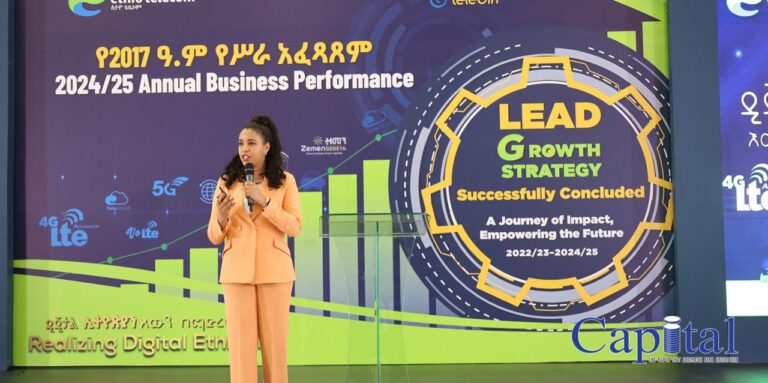Despite facing significant macroeconomic and operational hurdles, Ethio Telecom has reported robust financial performance in the last fiscal year, demonstrating resilience amid adversity.
The state-owned telecom giant recorded Earnings Before Interest, Taxes, Depreciation, and Amortization (EBITDA) of 76 billion birr, achieving 104% of its annual target. This figure marks an impressive 84% increase compared to the 34.8 billion birr registered at the conclusion of its previous BRIDGE strategy.
Ethio Telecom’s success comes despite numerous challenges, including the weakening of purchasing power due to macroeconomic fluctuations, foreign exchange shortages, infrastructure damages, security problems, cable theft, and operational interruptions. The company also confronted limitations arising from the constrained capacity of domestic contractors, recurrent power outages, and fuel scarcity.
Speaking about the company’s growth, Ethio Telecom CEO Frehiwot Tamiru highlighted the pivotal role played by the company’s digital finance platform, Telebirr. The service registered 7.29 million new users in the fiscal year, pushing the total subscriber count to 54.84 million—achieving 99.7% of its target and representing a 15.3% growth compared to the previous year.
However, Telebirr’s expansion was not without challenges. The platform encountered fraudulent activities related to digital transactions, limitations on bank fund availability, and delays in implementing standardized national procedures for customer verification.

Ethio Telecom said it has collaborated closely with federal and regional authorities to tackle these issues, including increasing reliance on local providers for telecom inputs. Ongoing dialogue with legislators has yielded positive results, accompanied by broad customer awareness campaigns aimed at strengthening protections against fraud.
The company reported paying 43.8 billion birr in taxes to the government during the fiscal year. Additionally, $23.5 million (approximately 2.41 billion birr) was allocated for loan repayments, and 12.6 billion birr was distributed as dividends to the government.
Telebirr’s contribution goes beyond facilitating digital money transfers; it fills a critical gap in financial inclusion by offering accessible mobile money services. Its extensive network of self-help channels, agents, and service centers across Ethiopia enables citizens to conduct transactions securely and conveniently, even in areas underserved by traditional banking infrastructure.
According to the company’s reference to the GSMA Global Mobile Money Report (April 2025), money transfers constitute 28% of the global mobile money transaction value. Telebirr has outperformed this global benchmark, with money transfer transactions representing 35.8% of its total transaction volume in 2024/25.
Ethio Telecom’s solid financial performance coupled with Telebirr’s sustained growth reaffirms the company’s vital role in Ethiopia’s digital transformation agenda. These achievements align with its ambitious three-year lead growth strategy focused on expanding digital services and financial inclusion nationwide.









